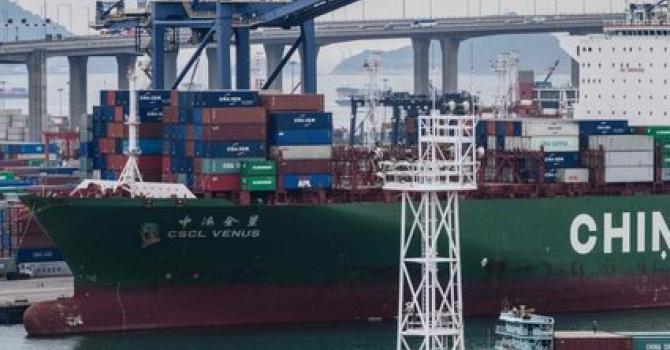CHINA DAILY: Policy Address should take up environmental initiatives
Christine Loh says HK must enact green programs in collaboration with the Bay Area to be a finance, innovation center of the future
Hong Kong’s annual Policy Address, delivered by the chief executive, is a major political event. The 2018-19 Policy Address will be delivered by Chief Executive Carrie Lam Cheng Yuet-ngor on Oct 10. Once something is stated, it will have a life of its own, requiring development into implementable projects. The text has probably already been finalized and we can expect a smattering of incremental ideas on the environment, such as in waste management.
Here are additional ideas she could ask her officers to develop in the coming year.
A timely new subject is Hong Kong’s vegetation and climate change. Super Typhoon Mangkhut knocked down many trees. The Environmental Protection Department is using a piece of land in Kai Tak to temporarily store fallen trees and it is allowing people to collect them free of charge. This is a good move so as not to waste wood that can be used. The public doesn’t want to see wood dumped at landfills.
The chief executive can direct the administration to develop a new policy to make full use of wood from fallen trees. Firstly, the government should have the right equipment to break up fallen trees into woodchips. Secondly, wood chips and sawdust should be used by government departments, such as Agriculture, Fisheries and Conservation Department and Leisure and Cultural Services Department for soil conditioning and composting. Thirdly, arrangements could be made with Hong Kong’s organic farmers since they too can use woodchips and sawdust for the same purpose.
Longer term, the climate change agenda needs to consider vegetation together with key stakeholders, especially the power companies as trees falling on power lines cause electricity instability, as well as public transport service providers as road blockage is a major problem immediately after typhoons.
If not in the Policy Address already, the chief executive still has time to slip in requiring the harmonization of marine fuel quality and standards with that of the Chinese mainland, as Hong Kong’s standards have fallen behind. The maritime community is expecting action and there is no reason for further delay.
Indeed, Hong Kong should have a new comprehensive policy together with Guangdong to implement a “green shipping and ports” plan for the Guangdong-Hong Kong-Macao Greater Bay Area to facilitate the transformation of as many types of vessels as possible to be more fuel-efficient and less polluting. The plan should include trialling zero-emission vessels where the technology is available. Hong Kong and Guangdong are wealthy enough to provide incentives and subsidies in trialling cleaner shipping and thus become a leader in the world.
Such a vision should include providing liquefied natural gas bunkering for ships in Hong Kong. This could attract LNG cruise lines to deploy LNG-powered ships to the Bay Area and help develop green cruising along the China coast.
The biggest challenge in air pollution policymaking is how to deal with ozone, which results in smog. This is the biggest remaining nut to crack in air science and Hong Kong is well-placed to be the center for such studies. The government can work closely with local scientists to turn Hong Kong into a center of applied learning in volatile organic compounds and atmospheric gases, the understanding of which is critical to policymaking to control ozone. Fighting ozone is an area where Hong Kong and Guangdong have agreed to step up collaboration. Thus, this is yet another great Bay Area project.
Green finance has captured industry imagination. As the government has taken this up by promoting green bonds, it is time for the chief executive to announce her wish to see more innovations. There are two aspects for Hong Kong to lead on.
Firstly, Hong Kong needs to take advantage of the mainland’s mandate that will come into force in 2020 for all listed companies on the mainland to provide environmental reporting. After all, about half of the companies listed in Hong Kong are mainland-related.
It makes sense for companies listed on the Hong Kong Stock Exchange to also be required to provide environmental reporting. The stock exchange has been promoting companies to provide environmental, social and governance (ESG) reporting on a voluntary basis and explain why if they do not. The mainland mandate represents a “push” factor for the stock exchange to ride on for at least environmental reporting.
While the decision whether to mandate rests with the Hong Kong Stock Exchange, the government can play a positive role since the chief executive has already said she wanted to see Hong Kong become a green finance hub. Environmental reporting promotes disclosure to investors. Indeed, this is what the mainland is trying to do with the 2020 mandate for listed companies on the mainland.
Leadership in green finance is not just about supporting the green bond market. Leadership is also about innovation — that means new ideas that can create new products and markets. Hong Kong has already stepped up efforts in fintech — that is using new technology to simplify, improve and integrate platforms.
A new generation of younger professionals is working on creating an investment framework to combine fintech and green finance in renewable energy. The idea involves enabling the public to buy shares in electricity generated from solar power on public and private infrastructure, such as reservoirs, sizable rooftops and other sites. Success will require various bureaus and departments within the government to cooperate with the private sector to make it happen.
If Hong Kong is to showcase it has the mojo to be a finance and innovation center of the future, government officials will have to show enthusiasm for such ideas. The chief executive could signal her ears are open in her upcoming Policy Address and that she would welcome such innovations.
This article is written by Christine Loh, chief development strategist, Institute for the Environment, HKUST and board member of CDP Worldwide, London; and also Jade Yung who is a freelance content and creative writer. She writes about innovation in multiple disciplines, including arts and culture, wellness and sustainability.
The article has appeared on China Daily https://www.chinadailyasia.com/articles/125/96/105/1538708414439.html?newsId=49929




